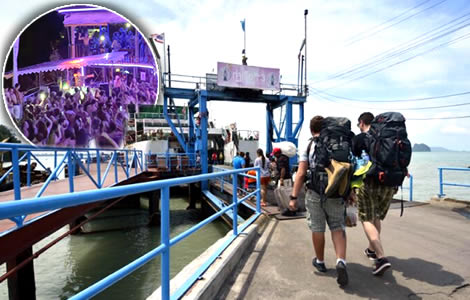Thai authorities launch a sweeping probe into Israeli-linked businesses on Koh Phangan as locals complain the island is becoming a “second Tel Aviv,” citing visa loopholes, sidelined Thai workers, foreign dominance of shops, and cultural disrespect, fueling protests and rising social tension in paradise.
Thai authorities have launched a sweeping probe into Israeli-linked businesses on Koh Phangan amid growing fury over foreign dominance of the island’s tourism trade. Ordered from Bangkok, the crackdown targets nominee companies and suspected illegal ownership of property across Thailand’s southern islands. Locals accuse Israeli operators of sidelining Thai workers, reshaping communities, and exploiting visa loopholes to run businesses disguised as tourism. Many arrivals, fleeing conflict at home, are now accused of turning paradise into profit zones. With anger spilling into protests, officials face mounting pressure to reclaim control, enforce the law, and protect the island’s identity.

Thai authorities have launched a sweeping investigation into allegations that Israeli nationals are illegally running businesses on Koh Phangan. The move follows weeks of public anger over claims that some foreign visitors are exploiting visa loopholes and disrespecting local customs. The controversy has shaken the island’s reputation as a peaceful tourist paradise and raised fears of deeper cultural friction.
Residents say the island, located in Surat Thani province, has increasingly become known as a “second Tel Aviv.” They allege that many Israeli visitors are not just tourists but long-term settlers who manage businesses through Thai nominees.
Some also complain that certain visitors act in ways that show open disregard for local traditions, such as temple etiquette or dress codes. Others have accused them of monopolising small enterprises and excluding Thai workers.
Israeli-Palestinian conflict sparks surge in Israeli arrivals and tensions across Thailand’s tourist hotspots
The growth in such activity appears to have been sparked by the Israeli-Palestinian conflict, which erupted in October 2023. Since then, Israeli tourists have been flocking to Thailand to enjoy a respite from the tensions caused by the emergency at home.
In particular, they tend to opt for niche locations that are also popular with upper-market Western tourists. These include the northern Thai town of Pai in Mae Hong Son province, in addition to both Koh Samui and Koh Phangan.
Online, the backlash has been fierce. Dozens of Facebook posts and local media reports have accused foreigners of pushing locals out of the tourism trade. A “Save Koh Phangan” campaign page has attracted thousands of followers within days.
It warns that the island is repeating the experience of Pai in Mae Hong Son province, where Israeli visitors settled, opened businesses, and even religious centres, eventually prompting a national-level investigation earlier this year.
Thai police chief orders crackdown and four-point plan to target illegal foreign business operations
Fueling public frustration, an old video resurfaced and went viral again. It shows an Israeli woman arguing with a Thai shopkeeper after being told to remove her shoes before entering. She shouts, “my money build your country,” before storming out.
The clip has been widely reshared across Thai-language platforms, symbolising what many see as growing arrogance among certain groups of foreign visitors.
In response to the uproar, Royal Thai Police Commissioner Pol. Gen. Kittirat Panphet issued an urgent directive on October 10. He ordered Region 8 Provincial Police to lead a full-scale probe with immigration and labour officials. The investigation will apply four key policy measures designed to clamp down on illegal business activities.
First, authorities must form a joint task force to inspect land ownership and company registrations possibly linked to foreign control. Second, they must audit financial trails and corporate records to confirm who truly holds company shares.
Third, they must tighten work permit enforcement through Immigration Police and the Ministry of Labour. Finally, they are instructed to prosecute all offenders, including any complicit Thai officials, without hesitation.
Israeli nationals top visa extension lists as Thai officials suspect long-term illegal business operations
According to Royal Thai Police spokesman Pol. Lt. Gen. Yingyot Thepchamnong, officers have already made several arrests on Koh Phangan and nearby Koh Samui. The charges range from operating unlicensed car rental firms to working beyond visa permissions.
Other cases involve running unauthorised tour businesses and acting as unlicensed guides. “We have identified patterns suggesting that some foreign groups have attempted to dominate certain tourism sectors,” Yingyot said.
New immigration data adds to the concerns. Koh Phangan District Chief Suriya Boonpan confirmed that, as of September 23, 2025, 2,627 Israeli nationals had applied for visa extensions. Of these, 2,125 held short-term tourist visas, while 502 possessed long-term permits.
Those included 181 business visas, 30 retirement visas, 152 student visas, 998 dependent visas, seven marriage visas, and 27 in other categories. Officials now suspect that some may be using multiple extensions to stay indefinitely while working or managing enterprises illegally.
Viral “Save Koh Phangan” campaign fuels anger as governor urges calm amid growing local frustration
A photo posted on October 6 by the “Save Koh Phangan” page has further inflamed local anger. It allegedly shows an all-Israeli beach party organised to “release stress from the war back home.”
The page claims the event caused serious property damage that forced the Thai owner to renovate at personal cost. While the report remains unverified, it has fueled calls for tighter rules and penalties for destructive or disrespectful behaviour.
Surat Thani Governor Teerut Supaviboonponl said authorities are aware of the growing resentment. He acknowledged that many online reports remain unproven but admitted that some concerns appear credible. “We must act carefully,” he said. “Thailand welcomes tourists, but we want quality visitors, not those coming to conduct business or exert influence.”
The governor emphasised that investigations will focus on illegal conduct, not nationality or religion. Meanwhile, immigration officers are reviewing records to identify visitors who repeatedly extend their stays.
Those found to be working without authorisation may face deportation or blacklisting. Local police have also been told to inspect commercial zones where foreign-run shops or rental businesses have expanded rapidly. The Ministry of Labour will verify whether employees and owners possess valid work permits.
Authorities balance tourism and law enforcement as locals demand action over foreign dominance claims
Officials insist that the crackdown is not aimed at discouraging tourism but at restoring fairness and public confidence. Koh Phangan’s economy depends heavily on foreign visitors, yet residents say the balance has tipped too far.
“We feel like guests in our own land,” one local vendor wrote online. “Foreigners own the shops, rent the motorbikes, and hire their own people. Locals are left with nothing.”
For decades, Koh Phangan has attracted travellers for its beaches, yoga retreats, and monthly full moon parties. However, the island’s image has shifted as social tensions rise.
Some long-term expatriates have expressed frustration that a few reckless individuals are tarnishing the reputation of all foreigners. “Most Israelis here are peaceful,” said one resident expat. “But a few bad actors can poison the atmosphere fast.”
Authorities in Bangkok are watching the case closely. The Royal Thai Police will compile findings for the Interior Ministry within weeks.
If violations are confirmed, tougher immigration controls and business audits could follow across other tourist provinces. The outcome, observers say, will test how far Thailand is willing to go to protect its laws without harming its tourism industry.
As the investigation widens, local officials have urged both Thais and foreigners to stay calm and cooperate. Reports of misconduct should be submitted through official channels rather than social media.
Locals call for swift action and respect as Thailand tightens scrutiny on foreign business control
Yet for many locals, patience is wearing thin. They want swift action, strict enforcement, and visible respect for Thai culture.
Whether Koh Phangan remains a paradise—or becomes a battleground of resentment—may depend on how local officials deal with this latest challenge.
Notably, it arises amid broader concerns about the purchase of land, property, and establishment of businesses in the area by foreigners in general. These foreigners are in effect establishing foreign tourism enterprises aimed at servicing Western tourists to the area.
Innovative Russian drug dealer and top DJ arrested on Koh Phangan peddling drugs to foreign tourists online
PM intervenes in rising standoff between Pai locals and Israeli foreigners in the idyllic tourist town
33-year-old Israeli entrepreneur arrested on Koh Phangan for running illegal motorbike rental service
Booming kiddies tours business operated by an Israeli special forces veteran smashed by Tourist Police
Over the last few years, police and officials have discovered the use of sophisticated software and business tactics to outcompete local operators. Indeed, these foreign operators often have advantages in terms of knowledge of the market and business acumen.
Certainly, this has also extended into illicit business operations. In June, police on Koh Phangan arrested a Russian drug dealer with an elaborate app and Dropbox system for retail storage of narcotics throughout the island.
At the same time, African nationals operating from a network in Malaysia are known to control the sale of cocaine both on Koh Phangan and Koh Samui.
In the meantime, Thailand’s National Police Commissioner General Kittirat Phanphet has additionally ordered a probe into property ownership on both Koh Samui and Koh Phangan by foreigners using Thai companies with nominee shareholders.
Join the Thai News forum, follow Thai Examiner on Facebook here
Receive all our stories as they come out on Telegram here
Follow Thai Examiner here
Further reading:
Body of crazed German man who refused to take his meds but instead smoked cannabis, found at home
Loony pot-smoking German who terrorises dentist clinics on the run in Nakhon Ratchasima. Arrested
29-year-old Indian tourist jumped to his death in Bangkok’s Sukhumvit area. Cannabis found in room


















